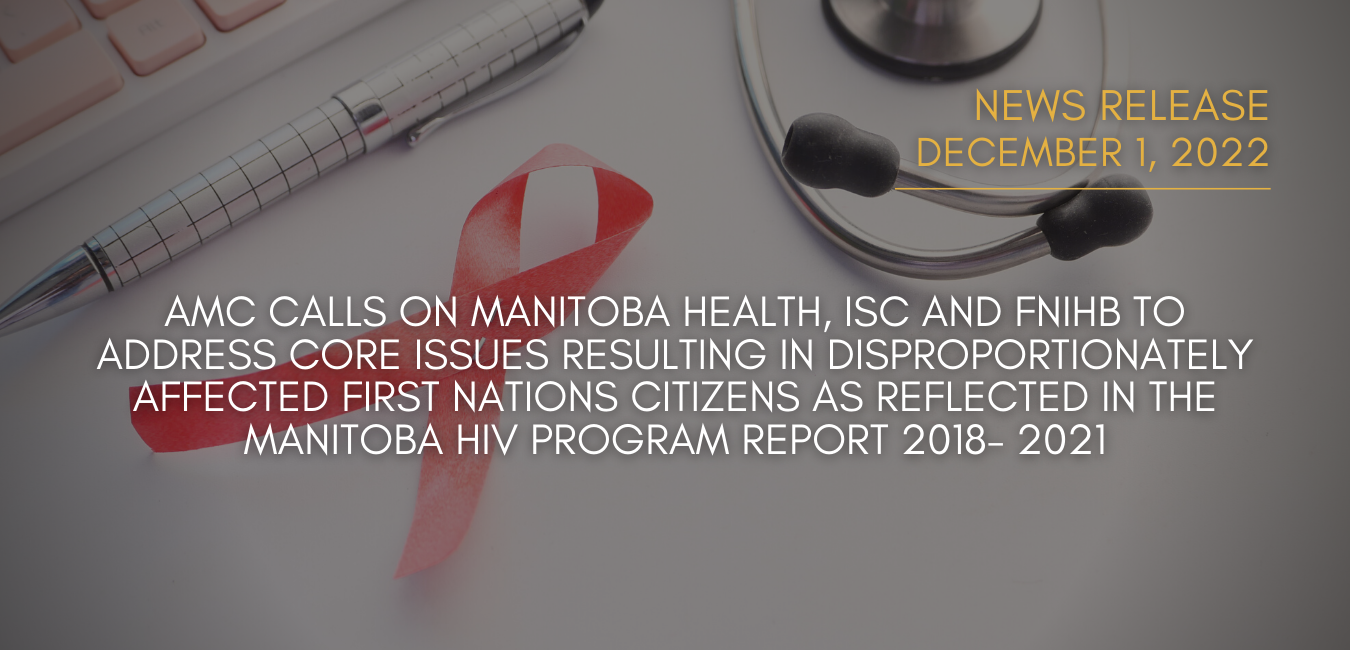AMC Calls on Manitoba Health, ISC and FNIHB to Address Core Issues Resulting in Disproportionately Affected First Nations Citizens as Reflected in the Manitoba HIV Program Report 2018- 2021

December 1, 2022
Treaty One Territory, Manitoba
AMC Communications
Treaty One Territory, Manitoba – The Assembly of Manitoba Chiefs (AMC) issues the following statement about the concerning statistics in the Manitoba HIV Program Report 2018- 2021. The results of this report, which were announced today, found that over the last five years, there has been a 20% increase in new HIV cases being First Nations persons.
As reported in the Manitoba HIV Program report for 2018-2021, Human Immunodeficiency Virus (HIV) cases have continued to increase in Manitoba. This trend is very troubling due to its impact on First Nations citizens. Currently, the rate of HIV is triple in Manitoba compared to the rest of Canada. Of these new cases of HIV, 70% identify as First Nation or Indigenous. In 2017, 50% identified as First Nation or Indigenous; among female cases, around 65-70% reported injection drug use.
First Nations and Indigenous females are the fastest-growing and disproportionately infected demographic with HIV in Manitoba.
“The steady growth of negatively affected First Nations women, girls, and 2SLGBTQQIA has been happening for years while the Manitoba public health care system has chosen not to act,” said Grand Chief Cathy Merrick. “We must look beyond calculated statistics; these are real people, being affected in real life-altering ways. These are the same First Nations citizens who are also victims of systemic racism and generations of colonial impositions that continue to predispose First Nations women, girls, and 2SLGBTQQIA to poverty, shelter insecurity, food insecurity, sexual violence, and addictions.”
Manitoba Health, Indigenous Services Canada (ISC), and First Nations Inuit Health Branch (FNIHB) have failed to provide appropriate education, prevention, treatment, and resources to stop the spread of this life-threatening disease. The AMC calls on Manitoba Health, ISC, and FNIHB to address core issues that First Nations women contend with for basic health and safety. The healthcare system and governments must address the addiction crisis by increasing education, increasing addiction treatment spaces, increasing mental health treatment, creating safe injection sites, and distributing clean injection supplies. These initiatives must also be made in partnership with Manitoba First Nations so that it is the most appropriate for our Nation’s individual needs.
“It is heartbreaking to hear about so many of our relatives living with this virus,” said Grand Chief Cathy Merrick. “We need to prioritize education to decrease the stigma and provide accessibility to testing, treatment, and the tools and resources to prevent further infection.”
For more information, please contact:
Communications Team
Assembly of Manitoba Chiefs
Email: media@manitobachiefs.com
About the Assembly of Manitoba Chiefs
The AMC was formed in 1988 by the Chiefs in Manitoba to advocate on issues that commonly affect First Nations in Manitoba. AMC is an authorized representative of 62 of the 63 First Nations in Manitoba with a total of more than 151,000 First Nation citizens in the province, accounting for approximately 12 percent of the provincial population. AMC represents a diversity of Anishinaabe (Ojibway), Nehetho / Ininew (Cree), Anishininew (Ojibwe-Cree), Denesuline (Dene) and Dakota Oyate (Dakota) people.